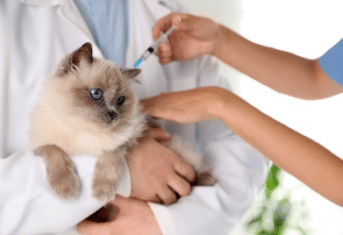Parvovirus in Dogs

Parvovirus in Dogs
Parvovirus has been in the news recently. In Rhode Island, the state veterinarian alerted dog owners to an increased number of parvovirus cases in the state.
Parvovirus is a serious contagious viral disease of dogs. The virus infects rapidly dividing cells, predominantly those of the gastrointestinal tract and the bone marrow.
Clinical signs of parvovirus infection revolve around the organ systems the virus infects. Most owners will notice signs involving the gastrointestinal tract. Dogs will have severe vomiting and diarrhea leading to dehydration. Blood tests performed by your veterinarian will detect the effects of the virus on your dog’s bone marrow. Parvovirus infection causes a dangerously low white blood cell count and severe infection follows. The vomiting is so severe dogs cannot take anything orally. Treatment requires intravenous fluid therapy to treat dehydration and intravenous antibiotics to treat infection. Other therapies such as antiemetics and intravenous feeding are also often required. Most, but not all dogs recover.
The virus spreads though oronasal contact with viral material contained in the feces of infected dogs. Infected dogs may be contagious for up to 30 days after exposure to the virus. Parvovirus can exist in the environment for months to years but can be inactivated by cleaning with a dilute bleach solution. Animal shelters, municipal pounds, pet shops, boarding kennels and dog runs are likely areas where dogs might acquire infections. Rottweilers, Doberman pinschers, Pit bulls, Labrador retrievers and German shepherds may be particularly at risk for contracting parvovirus infection.
The canine parvovirus was unknown until the 1970’s. Parvovirus evolved from a feline virus known as panleukopenia virus. The feline virus mutated and became infective to dogs, setting off a serious epidemic of canine parvovirus since dogs were naïve to this new virus and nearly every exposed dog contracted the disease. At that time veterinarians could do nothing to prevent the disease.
Today, prevention of parvovirus is simple. Vaccination is very effective in protecting dogs against parvovirus infection. Routine vaccination — called “core” by veterinarians — contains substances to induce immunity to parvovirus. After a puppy series of vaccinations, your veterinarians will determine your dog’s risk of contracting parvovirus infection and the required frequency of revaccination. Until your puppy is fully vaccinated, most veterinarians recommend avoiding situations where parvovirus is common.
Just as I finished writing this blog, I received a notice of an outbreak of feline panleukopenia via email. The outbreak is in California and resulted in the deaths of over 100 cats in a shelter.
Because these 2 viruses are very similar, the signs, route of infection and methods of prevention against feline panleukopenia are the same for cats as they are for dogs and parvovirus.
______________________
The Animal Medical Center
For 100 years, The Animal Medical Center has been a national leader in animal health care, known for its expertise, innovation and success in providing routine, specialty and emergency medical care for companion animals. Thanks in part to the enduring generosity of donors, The AMC is also known for its outstanding teaching, research and compassionate community funds. Please help us to continue these efforts. Send your contribution to: The Animal Medical Center, 510 East 62nd Street, New York, NY 10065. For more information, visit www.amcny.org. To make an appointment, please call 212.838.7053.


































